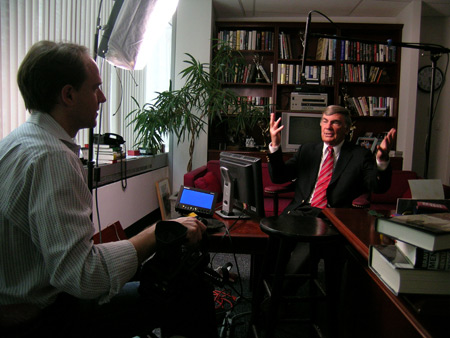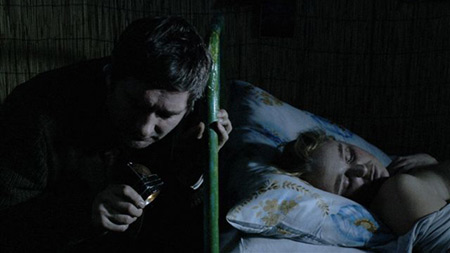
Chicago has a history of living in contradictions. It yearns to be a "world city," yet it refuses to accept that it may be one already. Likewise, the Chicago International Film Festival works to highlight the cosmopolitan nature of the city, but its choice of films seems to undercut the boldness a world city needs. The festival is conservative, its program comprised of established hits from other festivals: Cannes, Tribeca, and elsewhere. The rationale seems to expose Chicagoans to as many different voices as possible but in a way that doesn't necessarily challenge us.
Perhaps the Chicago International Film Festival wasn't designed to make any grand statements. The films are, as far as the depth of cinema is concerned, staid. They serve the purpose of allowing Chicago to feel important and worldly without making waves. It tries to straddle the line of mainstream festival fare and bold world and independent cinema, and it generally succeeds. But for all the big talk of the high-cultured city, Chicago toes the line instead of struts.
Here are my impressions of some of the films shown.
----
----
----
IDIOTS AND ANGELS
Bill Plympton, United States, 78 min.

Bill Plympton's animated film seems to breathe its images instead of simply projecting them. Its style is staggered, pencil-drawn with each frame delivering emotion differently. Together, they add up to a dark and limited view of the world through the eyes of our main character. We follow a misanthropic businessman through his routine of waking, dressing, driving, and finally drinking. It is in the bar where the businessman crushes dreams and abuses everyone. He sprouts wings one day, and over time they grow and force him to do good things, despite his efforts to go on living as he always did. The story is refreshing for its familiarity. It is a fable, and it takes a long time to remember what those were. There's just something magical about Idiots and Angels. It isn't a perfect film, but it is escapism grounded in a reality that I can't help but indulge.
----
TOKYO!
Joon-ho Bong, Leos Carax, Michel Gondry, France/Japan/Germany/South Korea, 90 min.
Tokyo! is a highly entertaining and fun film, showcasing three very different filmmakers' takes on the titular city. Broken up in three equal segments, there is no connection between the parts other than the location -- though given that none of the directors are from Japan, they certainly feel like the outsider's perspective looking in. As a unit, Tokyo! isn't very cohesive, and there is no unifying point to be made. One gets the sense that Michel Gondry's portion could have been made anywhere, at least any large city. The patter of his dialogue is certainly fun to watch, but the story of a couple looking for an apartment wears thin as the crux of the story is set up too late for anyone to care. Gondry's segment is rightfully overshadowed by Leos Carax's film that, in essence, reinterprets the Godzilla experience through human terms. The segment is hilarious and tender, allowing us to put this new type of monster on trial and hear why this "milk-eyed" man with a wild beard terrorizes the Japanese. It is not a revisionist Godzilla that humanizes a monster; it is simply a new and wildly fun way to look at it. Finally, Joon-ho Bong's portion of Tokyo! slows the film, bringing us back to earth after Carax's whirlwind. We see a man who has resigned himself from the world to live alone in his apartment, never looking people in the eye or stepping outside. After a woman (of course) snaps him out of his isolation, what we get is an intimate look at a character whose demeanor and rationale completely changes when he tries to get the rest of the world to leave their homes. As a whole, Tokyo! is skillfully filmed and passably told, but it is fractured, existing better in parts than as a unit.
----
BOOGIE MAN: THE LEE ATWATER STORY
Stefan Forbes. United States, 86 min.

Lee Atwater is the devil. He's racist. He's crude, he's crass, he's evil. He's brilliant. The Republican political strategist who got Strom Thurmond reelected to the Senate, and Ronald Reagan and George H.W. Bush to the presidency, did everything he could to win. Lee Atwater was born to win, no matter how dirty his campaigning became; slander and opposition research were his tools. This look into his life, which ended with a cancerous brain tumor and death-bed remorse at 41, is utterly engaging and fascinating. The documentary seeks to find a central narrative to Lee Atwater, a man whose legacy has shaped the Republican Party into what it is today. It is an ultimately humanizing view, which it has to be, otherwise Atwater is pure evil, and that is too simple an answer for a man so complex.
----
SICK SEX
Justin Nowell, United States, 12 min.
Short films were programmed in themed blocks. Justin Nowell's short, which is about a husband nursing his sick wife with the hope of sex as repayment for his humanitarian efforts, was shown under the heading, "Intimate Relations." Most of the shorts were not sexual in nature, and in a lot of ways neither was this provocatively titled movie. Nowell's short is funny, and the husband and wife have a great rapport, but the concept is a vamped-up scene of Everybody Loves Raymond. Wholly built on gender stereotypes, it is hard to not view this film through that lens. The plainness of the setting, the earnestness of the actors, and the generally natural feel of Sick Sex elevates it beyond the situation comedy, yet you can't help but want to critique it.
----
BERLIN - 1ST OF MAY
Jan-Christoph Glaser, Carsten Ludwig, Sven Taddicken, Jakob Ziemnicki. Germany, 95 min.
Berlin - 1st of May is yet another omnibus director collaboration, and this one is as unified as it gets. I am not especially familiar with May Day in Germany, so many of the cultural references were simply above me. That said, the issues at hand -- a country's radical past, its attempt at rectifying its future, and a disassociated youth -- are universal. We follow a Turkish boy intent on killing a cop, a policeman on watch during May Day while he deals with his marriage breaking apart, and two teens from the suburbs out for a good time in Berlin. It's all intercut, but, as you'd expect, it all comes together in the end. The film is surprisingly sprawling in its content, yet with every interaction, I gain a new revelation about the lives of the characters, as well as the state of life for those at the bottom. As the film culminates in a hospital, each taking wildly different paths to get there, a news report announces that May Day has gone off without incident or injury. We can wash away the past and the seedy elements of our society -- but just because we say that things are fine, doesn't necessarily make it so.
----
FOUR NIGHTS WITH ANNA (Cztery noce z anna)
Jerzy Skolimowski. Poland, 87 min.

There is something utterly depressing about seeing contemporary Eastern Europe in comparison to the United States. Bleak is an understatement. Skolimowski's latest film, Four Nights with Anna, shows us one of the most bleak characters Poland has to offer. The story is told out of sequence, bringing us forward and backward to the crimes with which Leon is charged. Leon witnesses a rape in progress and reports it, but as we find out later, he was convicted for the crime. Upon exiting prison, Leon develops a fascination with the victim and spies on her from his window, falling in love with her vicariously. He secretly drugs her and spends four nights with her, for which he's eventually caught. Complicated on paper, but the story is pretty intuitive. Still, jumping through time leaves a somewhat bad taste in my mouth, and revelations left to a trick of editing cheapens them somehow, as if we never have to truly understand a character's actions, only that he does them. That said, the film is shocking and gorgeous in a gritty (and yes, bleak) way. Billed as "zany" and "madcap" in the program guide, I found the expectations game hurt my opinion of the film more than anything. Four Nights with Anna is anything but zany or madcap, and Leon has his moments, but generally he isn't even endearing -- he's just sad. Consider all of that going in, and if you're still game, you'll have fun.
----
SON
Daniel Mulloy. United Kingdom, 17 min.
Perhaps my favorite short I saw at the festival, Son looks at the seedy world of filmmaking through the eyes of a child actor. There is a lot left to interpretation, but as Lee Atwater championed, perception is reality, so I can only go off how I experienced Son. A boy, somewhat forced to act in some movie in a decidedly creepy studio, sees his mom being taken advantage of regularly. His only means of coping is by escaping into a movie reality. We watch the mother try to escape the studio with her son late at night, but something is turning off the lights and it feels as if they are being watched (and chased). The film is actually tense and terrifying, and Mulloy has done a commendable job at making me care for this pair in just 17 minutes. They light their way down the hallway with an open laptop, and we think all is lost; they'll suffer through the night in vigil. Then the lights come up, and the camera pulls back, and the whole thing might've been a movie. The boy sees people fooling around in the background, and we can only hope he retreats back into his film reality. Son is truly exciting; seek it out.